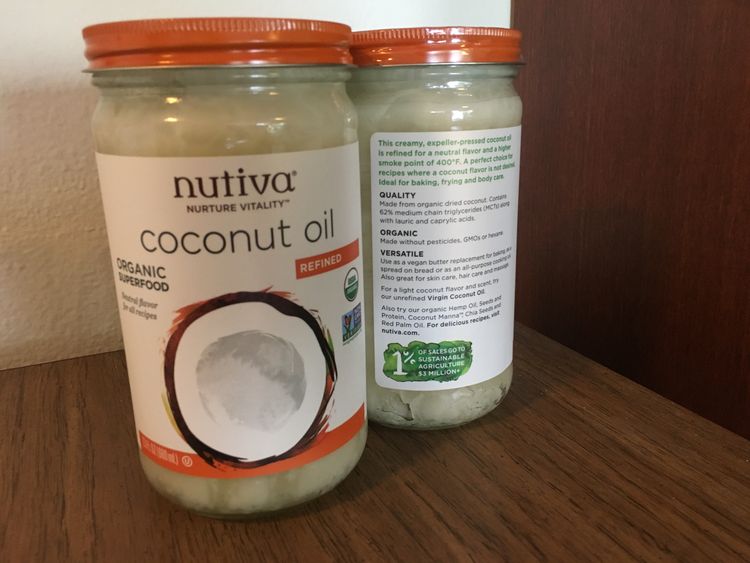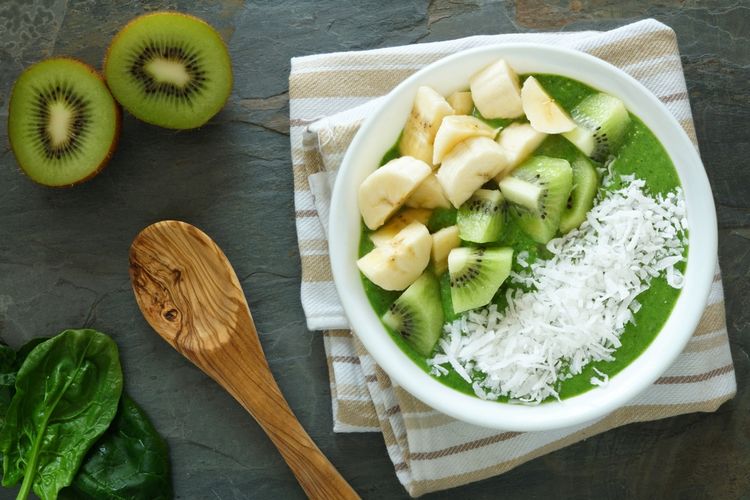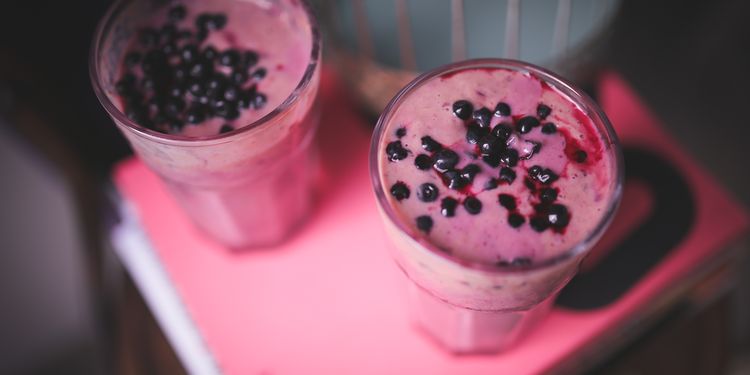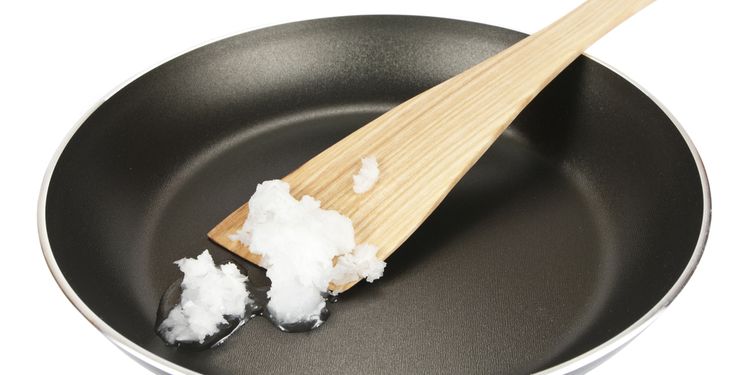19 Coconut Oil Food Uses

Knowledge is power. If you give a someone on a deserted island a fishing pole, its power as a tool for catching food will depend on the person’s knowledge of fishing rods and fishing.
The same goes for coconut oil. If you lack the proper knowledge, it can seem like nothing more than a jar of pasty gunk. But if you know why it’s good for you and how to incorporate it into your diet, it can be a powerful source of good health.
So, let’s gather some knowledge!
Why Is Coconut Oil So Good for You?
The source of coconut oil’s potent healing powers lies heavily in its fat content – specifically its high levels of healthy saturated fats and medium-chain fatty acids (MCFAs).
Healthy saturated fats make up 91% of coconut oil. This not only increases healthy cholesterol levels in your body but also converts unhealthy cholesterol to healthy cholesterol. That results in a healthier heart, lowered risk for heart disease, and balanced hormones.
More than 85% of the oil in coconuts is made up of MCFAs. There are many different kinds of these in coconut oil, but the big three are lauric acid, caprylic acid, and capric acid.
These three fatty acids are extremely beneficial to your health, providing anti-viral, anti-microbial, anti-bacterial, anti-inflammatory, anti-fungal, anti-oxidant, and even anti-cancer effects. They’ve been shown to fight candida and yeast infections, as well as boost the immune system.
Plus, they’re easily digestible, requiring only a 3-step digestion process, compared to the 26-step process some other fats require. MCFAs go directly to the liver for digestion and immediately convert to ketones, which are easily used as energy by the brain. This results in increased metabolism and faster, more sustained energy overall.
The healthy saturated fats and powerful MCFAs lead to a long list of concrete, proven health benefits of coconut oil including:
- Improves digestion
- Improves symptoms of gall-bladder disease, pancreatitis, and ulcerative colitis
- Helps prevent diabetes, cancer, heart disease, and osteoporosis
- Natural treatment for cancer, Alzheimer’s, and arthritis
- Helps with weight loss, fat loss, and muscle gain
- Clears up UTIs and kidney infections
- Improves memory and overall brain function
- Can slow signs of aging
- Reduces dandruff and moisturizes hair
- Can help heal periodontal disease and prevent gum disease and tooth decay
- Reduces stomach ulcers
- Lowers blood pressure and bad cholesterol
- Effective treatment for burns, dry skin, eczema, acne, dermatitis, and psoriasis
- Reduces cellulite, wrinkles, and age spots
- Balances hormonal and blood sugar levels
- Heals leaky gut
- Provides constipation relief
- Natural sleep aid
- Reduces symptoms and side effects of many medications, including some cancer treatments
…And this isn’t even the entire list!
When to Use Virgin vs. Refined Coconut Oil
Ok, it should be clear by this point that coconut oil is powerful stuff. But don’t rush out the door to buy a jar (or bucket) just yet!
First I need to tell you about a contentious grudge match going on in the world of coconut oils. This match is between two heavyweight contenders: Refined and Virgin.
In one corner stands refined coconut oil. The oil here comes from the already dried coconut meat, known as “copra.”
The copra undergoes a treatment of bleaching clays and high heat to purify it of contaminants that show up during the drying process. The heat and bleaching also remove the distinct coconut smell and taste.
During the oil extraction process, companies will sometimes use chemicals to pull as much oil as possible from the dried meat. And producers will often hydrogenate the oil or add other chemicals, such as sodium hydroxide, to drag out the shelf-life.
In the other corner is virgin coconut oil, also known as “pure” or “unrefined.” Virgin coconut oil comes from fresh coconut meat instead of dried meat, and two main methods can extract the oil: quick drying and wet milling.
Quick drying is the more common of the two and, true to its name, involves quickly drying the coconut meat before extracting the oil mechanically. Wet milling involves expressing the milk from the wet meat and then separating the oil from the milk by either boiling it, fermenting it, or using enzymes and a centrifuge.
Because neither of these techniques uses bleaching, chemical additives, or exposures to high-heat, the final product retains its distinctive coconut flavor and smell.
Now, I can hear you asking, “Which one should I pick? Which one wins?!” That’s up to you. It really depends on your personal preferences and tastes.
If the taste of coconut grosses you out, you’d probably be best off with refined coconut oil. Because it’s tasteless and odorless, it’s much more practical in the kitchen. It also has a higher smoking point of 450F (compared to virgin’s still impressive 350F), making it ideal for high-temperature cooking and baking.
Elizabeth Walling, a staunch supporter of refined coconut oil, correctly points out that refined coconut oil contains the same amount of MCFAs as virgin brands. She also claims it’s easier to digest for people with gut-related issues, because the refinement process purifies the oil of anything that could possibly cause an allergic reaction. What’s more, she says that some brands, most notably Nutiva, refine the oil without adding chemicals (I personally use Nutiva Refined Coconut Oil for this reason).
If, however, you’re more of a purist, and even the possibility of chemicals being used in the oil-extraction process makes you cringe, go with virgin coconut oil (Nutiva also makes a great product in this variety).
Dr. Axe argues that virgin, organic coconut oil, specifically when extracted via wet milling and fermentation, retains the most potent health benefits, because the extraction process doesn’t affect the chemical makeup of the oil.
According to Dr. Axe, compared to refined oils, virgin coconut oil has higher levels of anti-oxidants, is more effective in maintaining bone structure, and exhibits stronger anti-inflammatory effects. Finally, with virgin coconut oil, you can be sure that the oil isn’t hydrogenated, which adds trans fats to the oil.
19 Food Uses for Coconut Oil
Ok! You’re excited about the health benefits of coconut oil, and you’re all caught up on the refined vs virgin debate. You’ve got your jar of coconut oil in hand, and you’re ready to go. You just need to know how to use it! You’re thinking, in the words of comedian Brian Regan, “How do I get that goodness in me?!”

To get you started, here are 19 food uses for incorporating coconut oil into your daily diet:
First Thing in The Morning
1) Immune System Boost: A tablespoon of coconut oil will fight bad bacteria and give your system a break from relying on grains/sugars for energy.
Breakfast
2) Smoothie Booster: 1-2 tablespoons of coconut oil will improve any fruit smoothie! Your mouth will love the smooth taste, and your body will love the healthy fats.
3) “Buttering” Your Toast: Coconut oil is a flavorful, healthier option than actual butter.
4) Prolong Freshness of Eggs: Rubbing your eggs with coconut oil will seal the pores in the shells, extending their shelf-life up to 2 weeks.
5) Replacement for Non-Stick Cooking Spray: Coconut oil is the perfect oil to cook your eggs. No sticking, no mess!
6) Non-Dairy Coffee Creamer: Blend fresh coffee with some coconut oil and savor the rich, surprisingly creamy flavor.

7) Anti-Oxidant, Anti-Aging Boost: A morning bowl of fresh berries with coconut oil drizzled on top provides a powerful kick of anti-oxidants to reduce liver-stress and slow the aging process.
8) Healthy DIY Granola: Combine 3 cups of oats, a cup of chopped almonds, 2 teaspoons of cinnamon, ½ teaspoon of salt, 1/3 cup of honey or maple syrup, and 1/3 cup of coconut palm sugar. Toss the mixture with a 1/3 cup of melted coconut oil and throw it in the oven to bake at 350 degrees for 10-14 minutes, rotating the sheet halfway through.
Lunch
9) Healthy DIY Mayonnaise: Combine 4 egg yolks, 1 tablespoon apple cider vinegar, ½ teaspoon dried mustard, 1 cup coconut oil (melted), and ½ cup olive oil.
10) Boost Omega-3 Fatty Acids: Combine that mayo with some wild-caught tuna and you’ve got the makings of a deliciously healthy tuna-mayo sandwich. The coconut oil in the mayo will double the effectiveness of the Omega-3’s in the tuna!
Exercise
11) Healthy DIY Sports Drink: Add coconut oil and chia seeds to water for an energizing pre-workout drink.
12) Homemade Energy Fuel Snack: Mix together a tablespoon each of coconut oil, raw honey, and chia seeds for an invigorating mid-workout snack.
13) Muscle-Building, Fat-Burning Shake: Blend 2-3 tablespoons of coconut oil with some protein powder and fresh fruit for a revitalizing post-workout shake. Drink up and let the coconut oil’s MCFA’s do their work.
Dinner
14) Replacement Baking Oil: Replace vegetable oils and butter with coconut oil for all your oven baking. No conversions needed for recipes: 1 tablespoon of butter = 1 tablespoon of coconut oil.
15) Garnish for Baked Sweet Potatoes: Coconut oil and cinnamon work wonders on baked sweet potatoes, as do coconut oil, rosemary, and sea salt on sweet potato fries.

16) Sautéing/Frying at High Heat: The healthy saturated fats in coconut oil will remain stable and won’t oxidize at high temperatures, making coconut oil ideal for sautéing and frying your veggies.
17) Chocolate Coconut Fondue: Use a double boiler to melt a tablespoon of coconut oil with 2 cups of chopped dark chocolate (70% and up) over low heat, stirring periodically. Transfer it to a fondue pot and slice up some strawberries, bananas, and apples for dipping!
18) Healthy Popcorn: Use coconut oil for the cooking, and for some extra flavor drizzle some on top.
End of the Day
19) Immune Boosting Throat Lozenge: Add a tablespoon of coconut oil to a tea of licorice root/fennel root, honey, and lemon to wind down from a busy day.
Take it Slow
Coconut oil is a potent substance. If you have a sensitive system, consider easing into your use. Pick one or two of the above food uses, try them out, and watch how your body reacts. Give your system ample time to adjust to the strong anti-bacterial, anti-viral, and anti-fungal effects.
Elizabeth Walling recommends starting with less than a teaspoon per day to test your body’s reaction. If you feel fine, gradually up the dosage; if you feel some stomach pains however, reduce the dosage and take it slowly.
Soon enough, coconut oil will be just another part of your routine, integrating seamlessly into your diet, for which your body will thank you! While it won’t miraculously fix all of your health problems overnight or replace a generally healthy diet and lifestyle, you might be surprised to see what just a little coconut oil can do for your health.
Finally, remember that the above 19 food uses are only a starting point. Endless possibilities await when it comes to using coconut oil in your food! Cook with abandon, play with different combinations, and see what tastes good.
